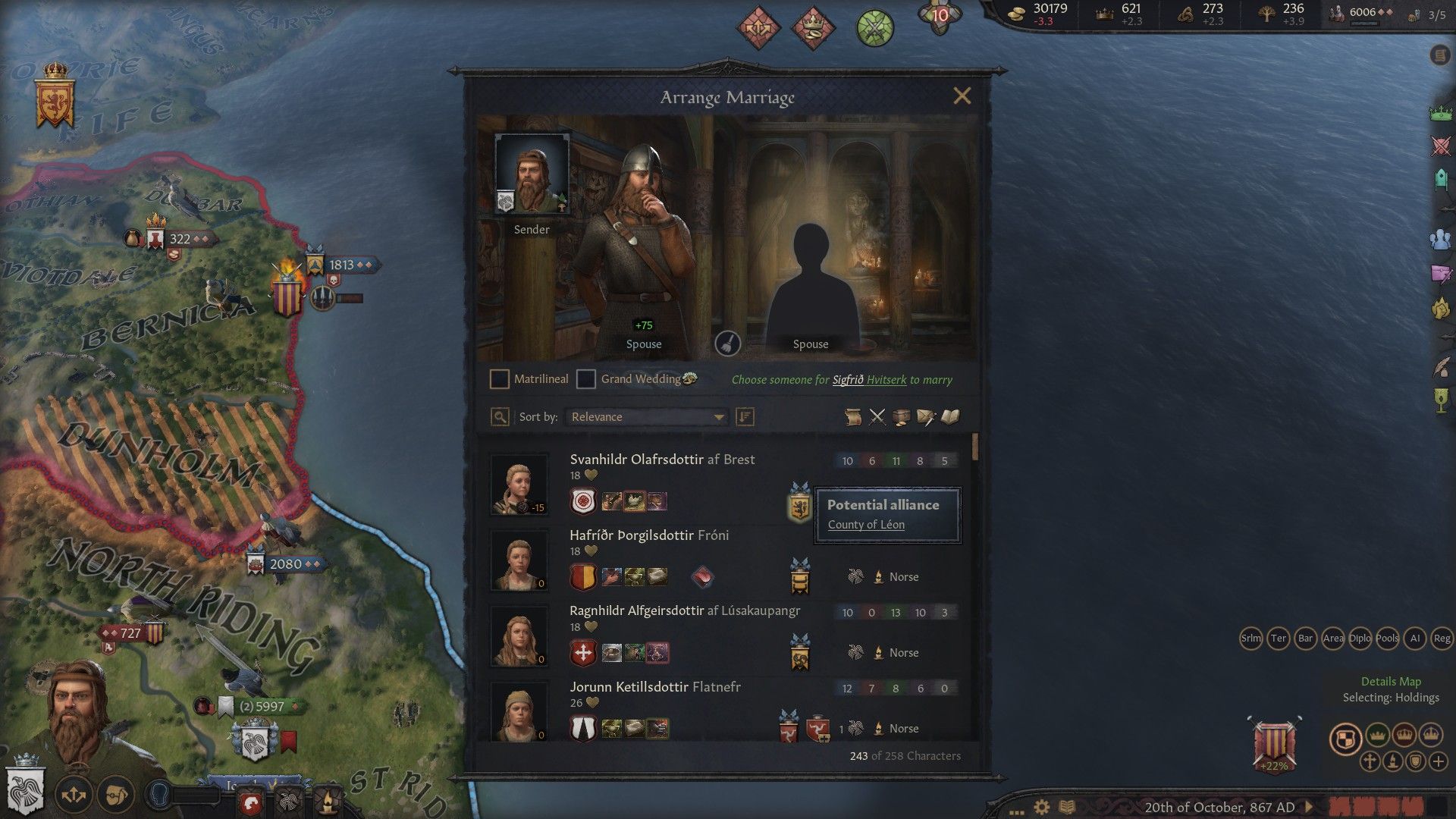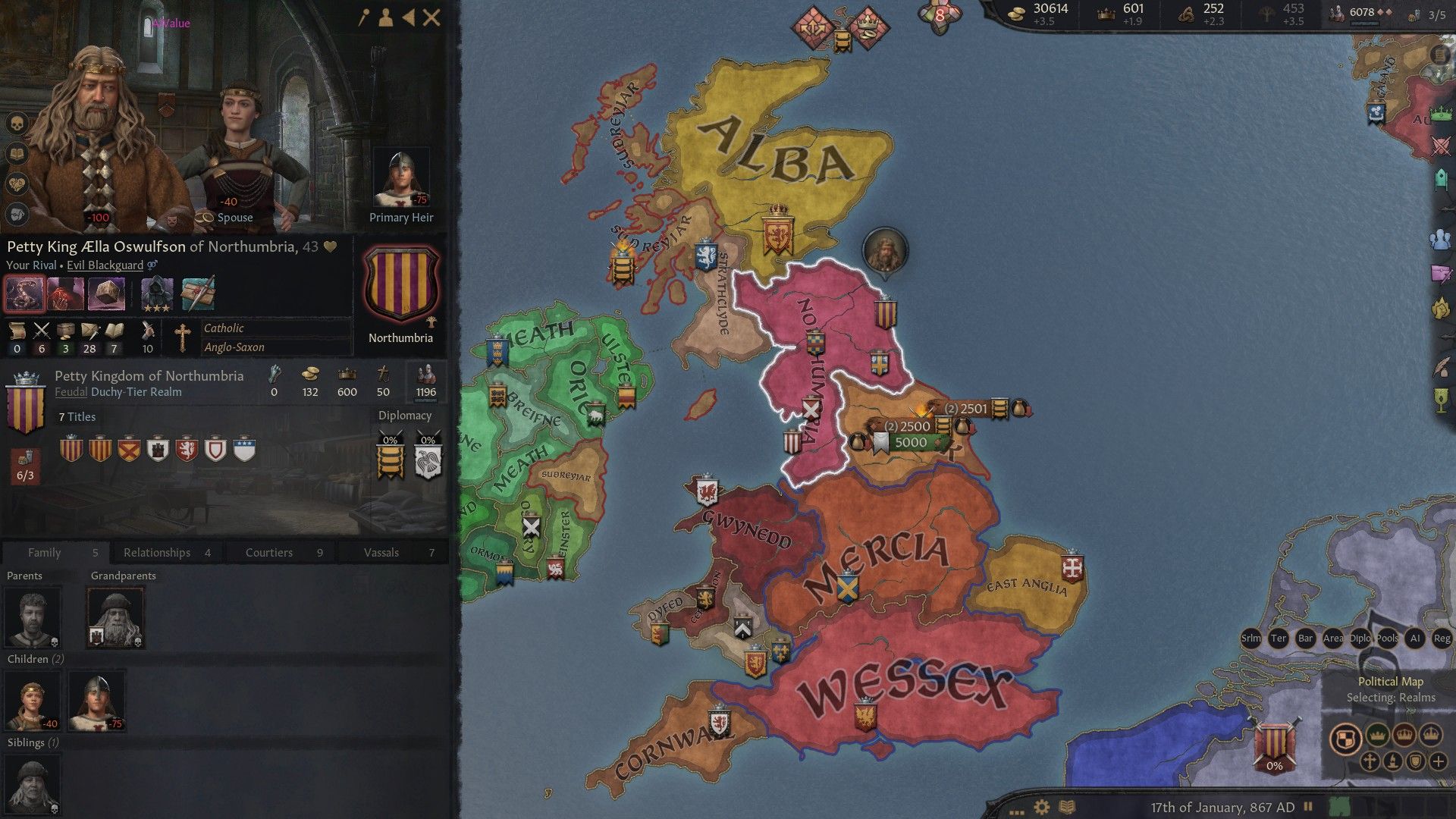
Master the Art of Alliances in Crusader Kings 3

Discover how alliances can make or break your empire in Crusader Kings 3 Learn the importance of forming bonds through blood and marriage, and master the art of invoking alliances to strengthen your position against larger rivals
In Crusader Kings 3, fairness isn't always a guarantee. Starting in either 867 or 1066, some nations hold more power than others, making it difficult for smaller-scale rulers on the outskirts of empires to maintain independence without utilizing alliances. These alliances can be a crucial tool to even the odds, allowing multiple duchy-level rulers to form an army comparable to that of a neighboring empire. However, alliances come at a cost and players must have a solid grasp on the system in order to effectively utilize them.
Bonds of Blood and Marriage
Simply put, in Crusader Kings 3, rulers will only consider forming an alliance with another ruler if they are closely related. This includes direct relatives such as siblings, parents or children, slightly distant relatives including cousins, nephews or uncles, or in-law relatives connected through marriage between close relatives. The game recognizes that a marriage between the close relatives of rulers automatically creates an alliance between the two rulers, which determines whether an NPC ruler will accept a player ruler's marriage proposal. As alliances work both ways, players should be cautious in selecting suitable matches for their family members.
Marriage alliances can be formed through betrothals, where players can offer their children to foreign rulers in exchange for military support. Even individuals who are not technically part of the ruler's dynasty, such as bastards or children from marriages with other houses, can be useful for forming alliances. In fact, they may be even more desirable since they will never inherit the ruler's titles. Players can easily identify close relatives who are not part of their ruler's house by the red blood droplet symbol. This can also be a way to utilize relatives with undesirable traits while still maintaining a beneficial alliance.
Players must carefully consider the potential consequences of forming alliances with closely related rulers who may not automatically align with them. Negotiating an alliance requires weighing factors such as the ruler's Opinion, relative strength, and current number of alliances. Additionally, rulers with too many allies may find themselves stretched thin, as only war leaders can call on their allies in battle. Therefore, players must strategically evaluate the benefits and risks of forming alliances with these rulers.
Once a ruler selects the Defensive Negotiations perk under the Diplomacy Lifestyle, they gain the ability to propose a single alliance with another ruler without requiring a marriage alliance. However, it is important to note that this option is not available during wartime. While marriage alliances can still be proposed and pursued during a war, the Defensive Negotiations perk offers a unique exception to the traditional family and marriage alliance rule. It is worth mentioning that in-game, this action is labeled as "Propose Alliance," whereas "Negotiate Alliance" pertains to alliances formed through family connections.
How to Invoke an Alliance
There are two main ways to make use of alliances: internally and externally.
When a ruler engages in war in Crusader Kings 3, they have the option to call upon their allies for support. Allies can choose to accept or reject the request, but typically NPC rulers will accept. If the ally is involved in a defensive war, it is even more likely that they will accept. However, if two allies are at war with each other, the request is more likely to be rejected. There is no cost to call upon an ally for a defensive war, but for an offensive war, there is a Prestige cost based on the ally's rank. The ally is then obligated to contribute to the War Score, and failure to do so may result in demands for Gold, Prestige, or contributions within a year. If the ally ruler fails to act, they will receive a -50 Opinion with the war leader and lose a level of Fame.
In an internal alliance, a liege forms a partnership with one of their direct vassals. Unlike external alliances, vassal allies cannot be summoned to war by their liege and vice versa. However, a vassal ally is obligated to refrain from joining any faction against their liege, while a liege ally cannot revoke a vassal's titles without a valid reason, free from tyranny. To dissolve a marriage alliance, the player must either end a betrothal or force a divorce between the married characters, which can prove challenging or impossible depending on the ruler's Faith's stance on divorce. In cases where divorce is prohibited, the player can hasten the "Til death do us part" clause to terminate the alliance.
Declaring war on an ally should be avoided as it comes with a high cost. It results in a penalty of 250 extra Prestige, loss of 1 level of Fame, and a -25 Opinion penalty for every character in the game for a period of 3 years. Alliances are also automatically broken upon the ruler's death, but it may be possible to renew them if the new ruler has close family ties to the previous ally. Another way to call in allies is through dynastic connections. A Dynasty Head can call in any member of their Dynasty outside their realm, regardless of how distant the connection is, but this incurs a cost in Renown. The cost of calling in Dynasty members remains the same whether the war is offensive or defensive, and it varies depending on the number of houses in the Dynasty. House Heads, on the other hand, can call other House members to battle without any cost.
Crusader Kings 3 is available now on PC, PS5, and Xbox Series X/S.















